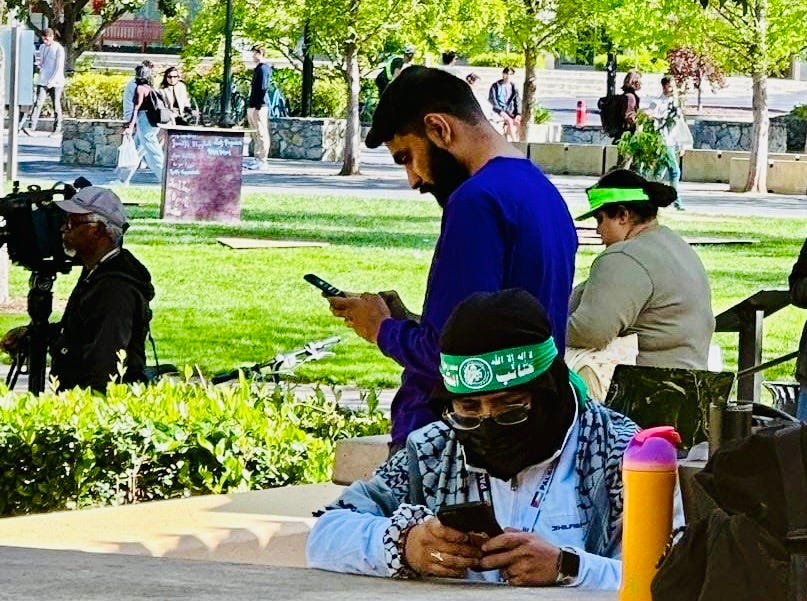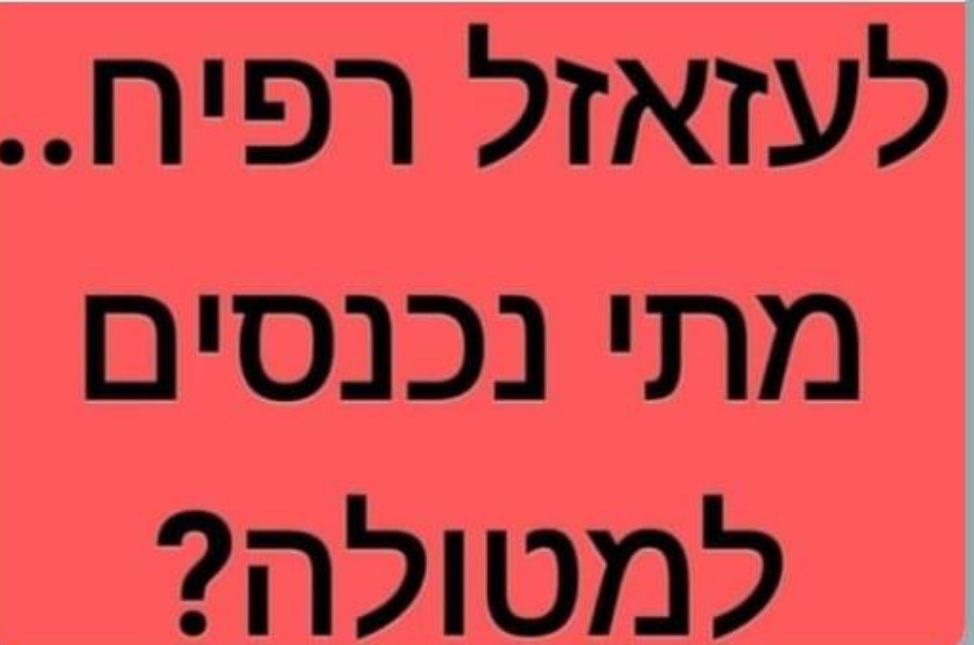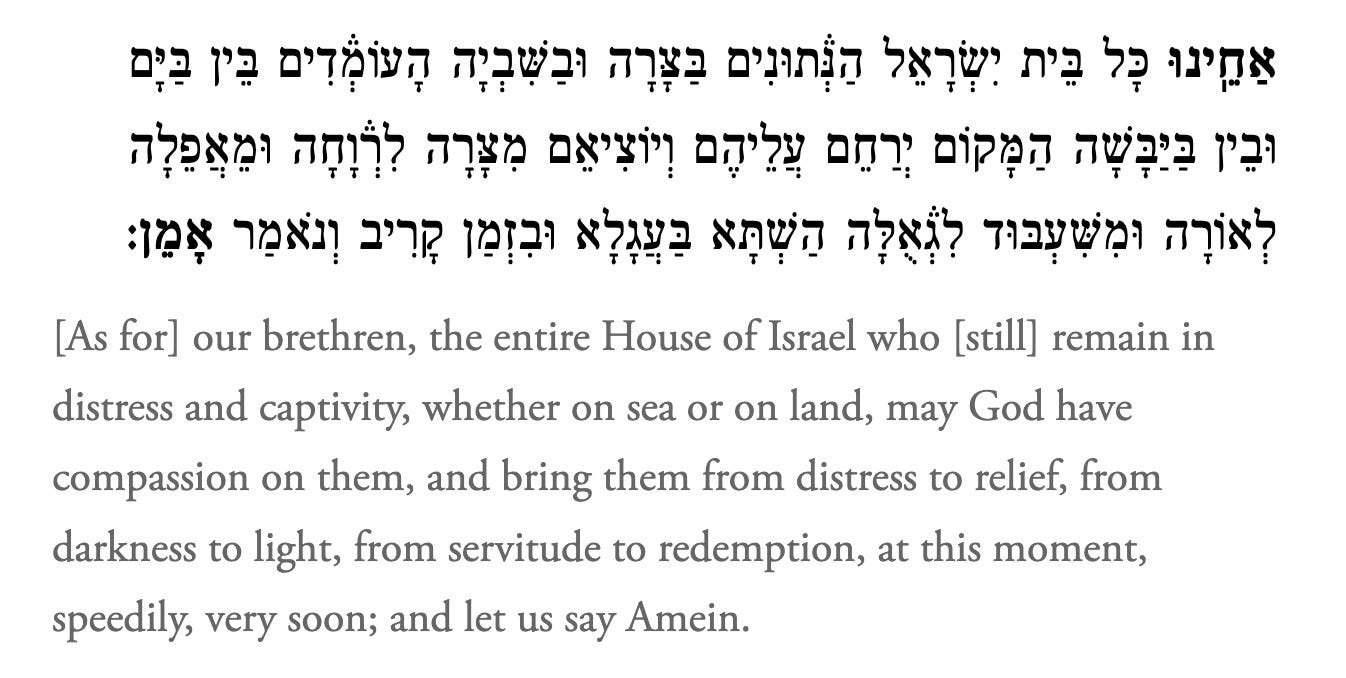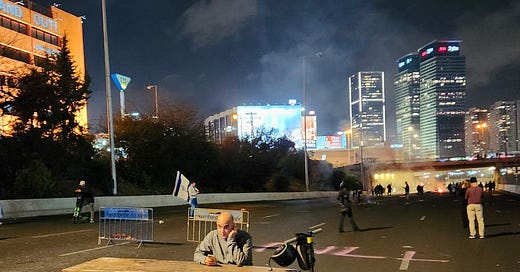

Discover more from Israel from the Inside with Daniel Gordis
"I saw the American progressive movement ... as an ally. That was a mistake."
An Israeli PhD student at Stanford, who formerly clerked at Israel's Supreme Court, shares what he's discovered about the American progressive left over these past weeks.

The photo above says it all. On Stanford University’s campus this week, in a photo posted by an Israeli PhD student who self-describes as a committed ideologist liberal, a man in a costume dressed up as a Hamas terrorist.
We’ll come back to that. First, a glimpse into an Israeli social media meme making its way around.
It translates, “To hell with Rafah. When are we going into Metula?”.
Metula, which is Israel’s northern-most town, is the center of the area that has been evacuated of citizens since mid-October. The government is still promising people that they will be home by September (after almost a year out of their homes) so their children can start school in their “real” schools.
But few here see any reason to believe that. So the meme making its way around is a way of saying, “While you (pretend to) deliberate between hostages and the Rafah operation over the border, has it occurred to anyone that we can’t even get our citizens back home inside the border?
The political pot is simmering. When it boils over is still not clear.
That photo Stanford University, above, was taken on the same week that Sheryl Sandberg’s new documentary, Screams Before Silence, illustrated once again the sickening sexual violence perpetrated not only by the Hamas terrorists, but the Gazan “civilians” who followed them into Israel.
We’re not writing much about the horror show unfolding in America. Those who live in America should do that. But when I came across this very thoughtful post by an Israeli PhD student at Stanford, who has previously clerked at Israel’s (unabashedly liberal) Supreme Court, his comments seemed well worth sharing.
He wrote in Hebrew, as you’ll see if you follow the link. What follows is a Google-generated translation, with many corrections and a few added explanations in brackets.
Original post can be found here, in Hebrew:
Five lessons from Stanford, California
The academic year in the United States is coming to an end. In a few weeks, the university students graduating will stand on the grass, in caps and gowns. They will excitedly take pictures, shake hands with the deans, and then fly away, making way for a new generation of their ilk.
Ahead of the graduation ceremonies, the anti-Israel student protests at American universities are also increasing. Let’s start with the “all clear” siren. Here at Stanford, at least, the students who sleep on the campus lawns and call for a "global intifada" are—as a rule—not dangerous in the physical sense of the word. But they are very dangerous in the medium and long term, as far as the image of the leader of the free world is concerned.
This is my second year at Stanford. When we returned here in September after the summer break, I intended to finish the year with an approved research proposal and a third of my PhD written. It's hard to describe how far I am from meeting that goal. In my opinion, I'm not really unusual. Since October, many Israelis abroad have found themselves forced to choose between two options—to put their heads down or become ambassadors without a choice. Who can even write an article when his two brothers are fighting in Gaza? Instead, I found myself spending much of my time on “outreach” activities that I had no intention of taking part in.
Despite this, I learned some very important lessons this year that I will never forget. As the school year comes to a close, and in light of the wave of anxious questions from around the country in light of the current round of campus madness, I thought I'd share the five most important lessons I learned this past year at Stanford, California.
1. Whether we want it or not, we are always—first and foremost—the Jews.
The first year here was a fabulous academic experience like no other. I felt surrounded by international friends. I was given full access to the world's brightest legal minds. The feeling was that endless opportunities lay ahead. Friends from Israel, who asked already last year if we suffered from anti-Israelism, sounded funny to me. No way!! I am a liberal Israeli. I wrote for the most leftist newspaper in Israel. I did my clerkship in one of the more liberal courts in the Western world. Why would anyone have a problem with me? I walked among those who I thought were friends as equals among equals. I could talk about Israel freely, criticize it and love it, have discussions that I thought were good and complex about the most sensitive issues even with those who clearly disagreed with me. I felt like a citizen of the world.
That was an illusion. There really is no such thing, it turns out, as a “Jew who is a citizen of the world,” as long as the Jew insists on his right to a national existence. For many of those whom I saw as friends, it turned out, I was first and foremost the Jew. At the moment of truth, few of them stood by me on a personal level. Almost none of them stood by me at the national level. Their double standards allowed Israel-hating students to say horrible things about me and my friends, but silenced our every attempt to oppose it. In some places, I had to choose between apologizing for my Israeliness and rejection. There was no choice to be made.
This eye-opening experience also has advantages. It is a litmus test for the human quality of those around us. Some of the people around me went out of their way to support me, or to show gestures of humanity. I found myself surrounded by strong and durable ties. I will not forget these friends easily.
2. America deserves Donald Trump.
An Israeli friend joked to me that if Trump is re-elected president in November, he will walk the halls of Stanford and hand out baklava. It's a very funny joke only because it's not entirely imaginary.
November 9, 2016 was a day that struck me with amazement. Like many all over the world, the fact that the United States of America elected Donald Trump as president was unimaginable. In a very deep sense, no matter how many commentaries I read, how many films and documentary series I watched—the appointment of this man seemed inexplicable to me. Unimaginable. Impossible. Even years later, when the words “President Trump” stopped feeling strange on the tongue, the choice of him seemed inexplicable to me. A glitch in the matrix. I couldn't understand how his campaign could be successful.
This year I finally got it. No, if I were an American I still wouldn’t vote for Trump. But I now understand those who vote for him. Donald Trump is some Americans’ answer to the madness on the other side, a madness I didn’t notice until it turned its face in my direction. A madness no less terrible than Trumps’s madness. No, if I had the right to vote, I would not vote for Donald Trump. But America deserves him.
3. The progressive movement is not a political ally of liberal Zionists.
Last year, the progressive movement seemed like an amusing youth rebellion to me. Yes, the ceremony where everyone announces their gender at the beginning of class seemed strange to me, not always necessary, but not harmful. The fact that I had to declare my race on every form I filled out (and make sure to state that I was “Middle Eastern”) made me laugh, but didn’t upset me. I saw the American progressive movement as the infantile sister of liberal movements that I respected. I saw it as an ally. That was a mistake.
I saw the American progressive movement as the infantile sister of liberal movements that I respected. I saw it as an ally. That was a mistake.
The “progressive” movement is not an amusing anecdote. This week I was exposed to a particularly graphic expression of this. In the “Pro-Palestinian” encampment (in double quotation marks, since a significant number of its residents are unable to point to the country on a map, and it is doubtful that they are able to name a single Palestinian leader) that was re-established in the heart of the campus, a man was photographed in a full terrorist costume—including a black sock hat with a slit for his eyes, and a green Hamas ribbon on his head, next to students who are active for transsexual rights. This strange alliance [DG - since Hamas executes those it considers sexual deviants, which obviously includes transsexuals] is not funny to me.
The progressives are challenging much more than the state of Israel, or the right of the Jews to a nation state. I’m not sure how many of the people who identify as progressives actually hold these ideals, and how many of them are just repeating them over and over loudly, with the intention of gaining some kind of social sympathy. But those of them who hold this position really no longer believe in the existence of “truth,” or in the existence of facts.
I’m not referring here to those who express the opinion that it is difficult to get to the truth, or who think that the courts do not always succeed in finding out what the facts are, or who hold that different ideas are perceived differently through different eyes. I’m speaking about those who say unequivocally that there is no such thing as truth. They are not interested in presenting facts to support their arguments because they do not believe there is such a thing as facts, and they say so explicitly. They think that it is forbidden to use the term “jihadist” in front of jihadists, or to call supporters of terrorism by their names, because feelings are more important than facts (although, of course, first and foremost their feelings). They don't believe there should be consequences for actions, because they don't believe there should be consequences for anything. Everything can be disputed, because nothing is real. Life is a debate club. It’s not a treat, or at least not just a treat: it’s an ideology. This ideology challenges the existence of objective truth—attainable or unattainable—as an intellectual concept.
4. Always go straight. It is not so important what is said or written about you.
The denial and turning of the backs of those whom I saw as friends, or at least fellow travelers, came with a temptation: to lower one’s head. I do not belittle and I completely understand Israelis who chose this. At this stage, for now, being ashamed of being Israeli, suppressing Jewish symbols, trying to adopt the American accent—can ensure a reasonable quality of life even in places where hatred of Israel is very present. But when the temptation was placed in front of me—to some extent at least— I tried to remember what I had learned from two teachers in recent years.
Attorney Momi Lemberger usually tells his interns to “always walk straight.” When a decision is made in a case—should an indictment be filed? Should the charges be dropped?—The only thing that matters are the facts and the law. It is easy to be tempted to consider what was written in the newspapers. What the minister says. The chance to advance in the system. But considering such considerations inevitably leads to bragging, to losing one's way. Judge George Kara used to tell his interns that “it doesn't really matter what they say or write about you.” The facts are more important. Making the right decisions is more important. There is no reason to align with vanities, even if it has some social or public cost.
These lessons are true in relation to greater and much more important decisions than the personal decision of whether to keep one's head down or insist on externalizing and being proud of one’s Israeliness, even in unpleasant forums. But they are infinitely true when the heaviest price to pay for going straight is that some American PhD students will turn up their noses at you. Since October, I’ve learned that there’s no point in keeping your head down, while there is intrinsic value in the decision to always going straight, to calling a spade a spade.
5. The solution to the university crisis cannot come from below, but it can be parachuted from above.
The kids protesting in these university yards worked very hard to get accepted to Harvard, Stanford, Yale, and Columbia. Most of them are not the “Vietnam generation,” even if that is what they tell themselves. They are the equivalent of the 8200 children and IDF Radio in Israel. [DG - both very prestigious jobs in the army, the former in one of the most respected intelligence units, the latter on the radio, a position very hard to snag.] They worked very hard and paid a lot of money to get here, and they care a lot about how they graduate. More than that, they care what the characters they value think of them. True, they care what their classmates think. Most of them care just as much what the President of the University, the Dean of the Faculty, and even the lecturer in the course think of them.
For many of them, the current wave of protests can be an educational opportunity. American universities repeatedly emphasize the importance of freedom of speech in American culture, the centrality of the First Amendment to the Constitution which guarantees absolute freedom of speech in the American political atmosphere. They can’t shut them up. That is true. But the universities can, and are even obliged, to educate their students. They should not and cannot prevent these children from screaming their demands to spread the intifada or boycott Israel. But they can tell them that they hold very stupid positions.
If university presidents would stop trembling in their own shadows, they could tell their students that they have a right to express stupid views, but that shouting them out won’t make them any more correct. Lecturers cannot silence their students, but they can emphasize that anyone who expresses uninformed or unfounded positions with great confidence is an educational failure. An Israeli—as I discovered—cannot really convince his American counterpart that Israel is not committing genocide, even if there is not even a shred of evidence to support the argument that what is happening in Gaza is genocide. But if the president of the university were to look at his students and express sincere disappointment when they express such a preposterous position, something in a significant portion of those students might shift.
The effectiveness of the “direct information”—in front of the young students—exists, but is very limited and in any case organized bodies can hardly promote it in an inorganic way. The solution, in my opinion, lies in putting pressure on the presidents. And there is urgency in this—today's generation of presidents and senior lecturers are still old and established people, who were educated in the 1970s and 1980s. They remember the Six Day War and Yom Kippur War. They are liberals, but they are liberals like Bill Clinton. They have respect for Israel. They have no intention of responding to the BDS demands that many of their students voice. In private conversations with Israelis, they also express their feelings of affection for Israel generously. But their feelings of fear of their American students are immeasurably stronger than their affection for their Israeli students. The pressure needs to be put on them. If they are freed from the terror that grips them of expressing their opinion, they can set boundary lines, and these may seep down—to those who want to participate in the “pro-Palestinian” festivals, to make an impression, but want more to be loved by important people in their professional lives.
If we do not take advantage of the present opportunity, we will find ourselves in a short time standing in front of a new generation of presidents and deans. It is not known if they will still have positive feelings—however repressed—towards Israel.
(In the photo: a man in a terrorist costume, this week at Stanford).
Subscribe to Israel from the Inside with Daniel Gordis
Israel from the Inside is for people who want to understand Israel with nuance, who believe that Israel is neither hopelessly flawed and illegitimate, nor beyond critique. If thoughtful analysis of Israel and its people interests you, welcome!




















